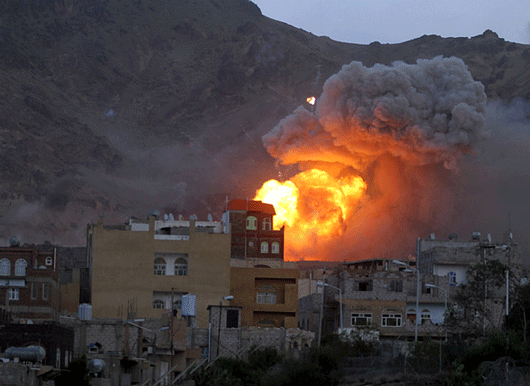
By Álvaro D’escoto
The Yemen ceasefire, which went into effect on Sunday, April 10, appears to be largely holding.
That’s good news for the people of Yemen, as it raises hopes that the upcoming UN-brokered peace talks are actually going to have something to work with. However, it’s bad news for those who tried to effect regime change in the poorest country in the Middle East, mainly Saudi Arabia and its blood-drenched cronies.
Last year, when their aerial bombardments began, the regime changers claimed they would declare victory within days or weeks, which was wishful thinking. But when the illegal campaign failed, they continued to target schools, hospitals and many other civilian structures in revenge, just to make a point that ‘yes, we can.’
Over a year into the Saudi-led and US-backed war, however, things have changed, and expectations that the regime changers can produce a total, uncontested military victory have dimmed. That explains why they are now talking peace. They have no choice. Still, that doesn’t mean they really want peace.
Far from it, the colonial campaign to divide and rule Yemen still tops the agenda. Any doubters should ask Afghanistan, Iraq, Syria, and Palestine. Just like in those countries, the key policy in the so-called Yemen peace and reconciliation talks is not ending the bloodshed and saving the people. It’s just a shift in tactics.
The regime changers want to attain through talks what they couldn’t in the battlefield: Occupying and dividing Yemen into ethnic-sectarian lines, and stopping it from becoming a unitary state - in cooperation between Saudi, Israeli, British, and American intelligence agencies.
Far from being a one-off policy, this is a high point in systemic collaboration between the Saudi-led and US-backed coalition members to degrade the Resistance Front (Ansarulah) through a combination of international pressure and national dispute/pressure over the terms of ceasefire and any future "peace" accord.
This will happen through familiar patterns and amid negotiations: Continuation of Special Forces operations and drone strikes (unilateral US policy and Western counter-terrorism efforts) against Al-Qaeda (which began in 2001 and will now include Ansarullah targets), creation of a no-fly-zone over the Saudi-Yemeni border areas on the pretext of "humanitarian assistance", adoption of UN Security Council resolutions against the resistance group of Ansarullah in the form of sanctions and arms embargo (similar to those imposed on the Lebanese Hezbollah and the Palestinian Hamas), as well as many other illegal measures to curb Yemen politically, diplomatically, and economically.
Meaning, despite their assertions to the contrary, the new ceasefire has nothing to do with supporting the legitimacy of a political process in Yemen. The ultimate goal is to maintain the continuity of authoritarian governance in the region by actively repressing the popular forces that threaten to undo the status quo.
To this end, the warmongers will continue to build military bases in and around Yemen, maintain the trade and arms embargo as well as the blockade, and lump together Ansarullah, Iran and the popular democratic movements of the Arab uprisings of 2011. The policy indicates both their broader strategic goals, and the dangers to positive political, economic and social change they represent.
Expect no permanent ceasefire and peace, and certainly no end to all foreign military attacks and "anti-terrorism" efforts. Expect no humanitarian assistance either, including international reconstruction aid, resumption of broad national dialogue, and establishment of an inclusive national unity government. Whatever it is, the covert war on the Resistance Front and the people of Yemen has only just begun.
Source: Syria 360, Edited by Website Team